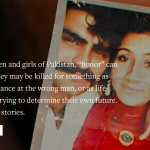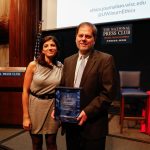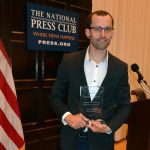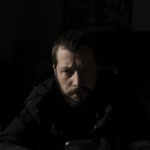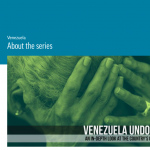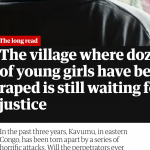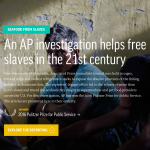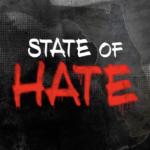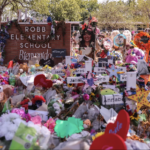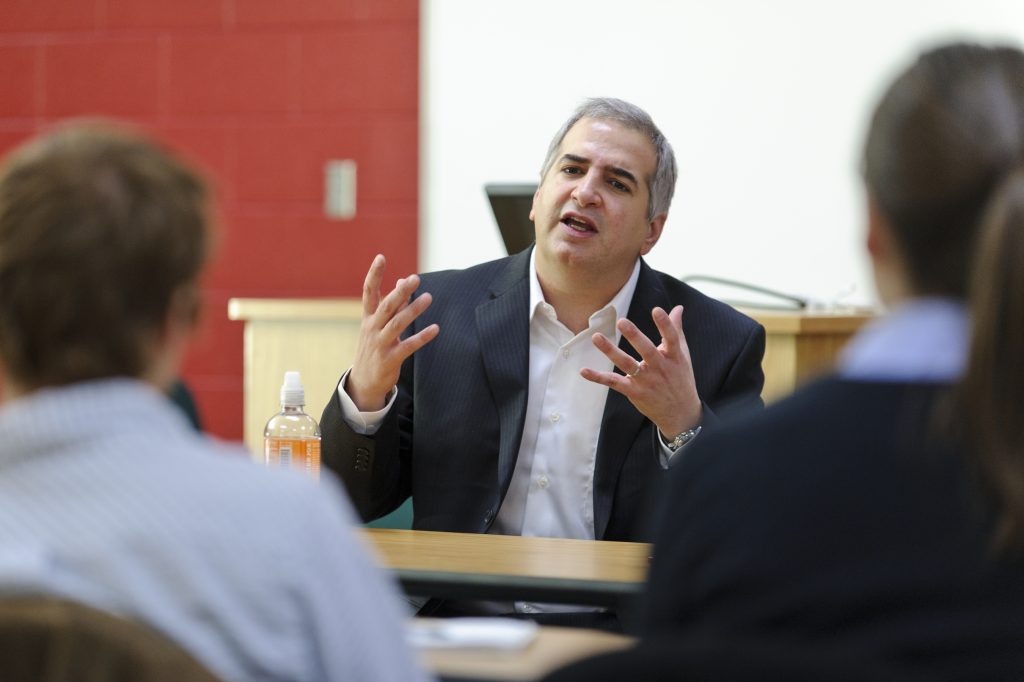
“The best journalism is sometimes about footnotes, when we write small to say something big.” – Anthony Shadid in his lecture, The Truths We Tell: Reporting on Faith, War and the Fate of Iraq
JOURNALISM LESSONS IN ETHICS, INTEGRITY & IMPACT
The Shadid Curriculum draws from the outstanding journalism of those who have won or been named a finalist of the Anthony Shadid Award for Journalism Ethics, an honor given annually by the Center for Journalism Ethics at the University of Wisconsin–Madison. Launched in 2021, the curriculum encourages student journalists to consider thorny ethical issues and place themselves in the position of making difficult journalistic decisions.
SIX AREAS OF FOCUS
Our case studies fall into one of six areas of study – approaching stories without prejudice, balancing intrusion and respect, intervening in a story, journalism as a public service and protecting sources. Click on any of the photos or links below to access the complete case studies. Questions about this curriculum? Contact krista.eastman@wisc.edu.
When reporting, journalists work with a great number and diversity of sources and topics. Some stories cross cultures and some reach into the forgotten past; some stories may appear ethically clear cut while others are more ambiguous. Are journalists always expected to be “neutral and unbiased” in their work, and how should they operationalize these ideas?
Inside Myanmar’s Crackdown: Constraints of Time and Place
Shadid Award finalist Ali Fowle and collaborators at Al Jazeera produced the first long-form report about the protests in Myanmar after the military took control in February 2021.
Shadid Award finalist Kathy Gannon (Associated Press) spent much of 2016 investigating the phenomenon of honor killings, in which women are disowned, tortured or killed for “dishonoring” themselves or their family.
Reporters at the Kansas City Star were finalists for the Anthony Shadid Award for their 2020 work uncovering their own news organization’s history of unfair coverage of Kansas City’s Black community.
2016 Shadid Award finalist Gina Barton (Milwaukee Journal Sentinel) reopened a 40-year-old unsolved murder case with the potential to reflect badly on individuals and institutions.
A journalist’s work never happens in a vacuum, as sources play an intimate role in the reporting process. When the boundaries and privacy of a source are in conflict with the publishing of a story, under what conditions does one become more valuable? How can a journalist mitigate this friction between privacy and transparency?
Words of Conviction: Balancing Intrusion & Respect
2023 Shadid Award finalist Brett Murphy (ProPublica) explored the harm of junk science used in the criminal justice system by speaking with victims of a 911 Call Analysis program.
Contrera: Learning from Sources
2022 Shadid Award winner Jessica Contrera spent months investigation child sex trafficking in the US, working with victims and parsing out exactly how anti-trafficking laws are failing vulnerable children.
2018 Shadid Award winners Brian Grow and John Shiffman (Reuters) investigated the industry responsible for renting, selling and dissecting recently deceased people for profit.
2021 Shadid Award finalists Amy Brittain, Reena Flores and Bishop Sand created a seven-part podcast on the struggles of two women who chose to share their stories of sexual assault and the difficult process of meaningfully conveying their stories.
2019 finalist Christy Gutowski (Chicago Tribune) chronicled how Illinois state child-welfare officials repeatedly failed to protect a 5-year-old boy who was eventually murdered by his parents.
“Journalists should be honest and courageous in gathering, reporting and interpreting information.” This is a quote from the Society of Professional Journalists Code of Ethics. Are there caveats or limits to how we define “honesty?” Is it ever permissible to be deceitful in reporting?
2017 Shadid Award winner Shane Bauer (Mother Jones) compiled a six-part series investigating corporate run private prisons. After becoming a guard for a Louisiana private prison for four months, Bauer found cost cutting measures and institutional failings including rampant violence, understaffing and abuse of prisoners.
2017 Shadid Award finalists Jenn Abelson, Bella English, Jonathan Saltzman, and Todd Wallack (The Boston Globe) investigated a handful of elite private schools in the New England area, uncovering rampant sexual abuse and misconduct between faculty and students. Given the number and diversity of cases, many of the instances had to be considered on a case-by-case basis.
Journalists are expected to be detached, uninvolved actors responsible solely for observing and reporting. Sometimes, journalists find themselves in a position to intervene – to rescue a source, challenge an injustice, or use their writing to effect change. When (if ever) is this permissible?
2023 Shadid Award winners Mystyslav Chernov, Evgeniy Maloletka, Vasilisa Stepanenko and Lori Hinnant (Associated Press) documented the atrocities committed as Russian forces closed in on the Ukrainian city of Mariupol in March 2022.
2017 finalist Hannah Dreier (Associated Press) chronicled the economic unraveling of Venezuela by reporting on the suffering of Venezuelan citizens and the failing institutions around them.
2017 Shadid Award finalist Lauren Wolfe (The Guardian) was the only Western journalist reporting on a series of kidnappings and rapes afflicting an impoverished village in eastern Democratic Republic of Congo. When she thought international media attention would bring justice to this village, Wolfe went to DRC to do a long-form story for The Guardian.
2016 Shadid Award winners Martha Mendoza, Margie Mason, Robin McDowell and Esther Htusan (Associated Press) were investigating the Indonesian island village of Benjina’s fishing industry when they realized that fishermen who talked with them faced possible execution. This revelation, combined with extensive evidence of abuse and the strong implication of coerced labor, led to an important decision: the reporters and their editors decided to rescue their sources from the island before publishing their story.
Journalism can be understood as public service in many ways: as a provider of the information citizens need to self govern, as a watchdog, or as a spotlight to bring awareness to an underrepresented community or problem. How can journalists effectively and ethically leverage this power for the good of society?
2023 Shadid Award finalists from the WFTS/ABC Action News team investigated the sharp uptick in hate groups and hate incidents in Florida with the goal of providing its audience with the resources needed to identify, report and combat hate.
2023 Shadid Award finalist Tony Plohetski was the first journalist in the country to obtain video of the school shooting in Uvalde, Texas on May 24, 2022. The video would dramatically alter the public’s understanding of how police responded to the tragedy.
2021 Shadid Award finalist Amy Silverman uncovered mismanagement and neglect in Arizona’s Division of Developmental Disabilities and took care to share her findings a new and accessible way.
Shadid Award finalists from The Palm Beach Post recognized the magnitude of the local drug epidemic by filling its entire front page with a collage of every Palm Beach County man, woman and teen who died from an opiate-related death or overdose in 2015.
2016 Shadid Award finalists Jill Riepenhoff, Michael Wagner, and Lori Kurtzman (The Columbus Dispatch) wrote about the growing public health issue of suicide, balancing privacy with fears of copycat incidences while reiterating the need for transparency and honesty.
2018 finalist Mike Rezendes (The Boston Globe) explored the pain and neglect experienced by unacknowledged sons and daughters of Catholic priests around the world in a piece that uncovered a global trend of abandoned children.
The relationship between reporter and source is sacrosanct, but sometimes the nature of the story puts sources at risk, physically or emotionally. What obligations do journalists have towards protecting their sources, and what steps can they ethically take to mitigate harm?
The Night Raids: Protecting Sources
2023 finalist Lynzy Billing traveled to more than 30 sites in Afghanistan to track down and count civilian deathsat the hands of Afghan soldiers funded, trained and directed by the CIA. By cultivating sources and speaking to people on all sides of the conflict, Billings painstaking revealed 452 CIA-backed deaths.
2022 finalists Brandon Stahl, A.J. Lagoe, Steve Eckert and Gary Knox (KARE 11) revealed that criminal suspects deemed too mentally ill to stand trial in Minnesota are often released without adequate treatment due to gaps in state law.
2018 Shadid Award winners Julie K. Brown and Emily Michot (The Miami Herald) led a three-part series investigating Jeffrey Epstein, a wealthy hedge fund manager who struck a deal with U.S. prosecutor Alexander Acosta to bury his crimes of sexually abusing and trafficking dozens of underage girls.
2019 finalists David Jackson, Jennifer Smith Richards, Gary Marx, and Juan Perez, Jr. (The Chicago Tribune) authored an investigative series exposing Chicago schools’ failure to protect students from sexual abuse and assault.
2019 Shadid Award finalists Maggie Michael, Nariman El-Mofty and Maad al-Zikry (Associated Press) reported on the atrocities occurring during the Yemeni Civil War. Much of their investigation centered around interviews with those most impacted by the conflict.
About Anthony Shadid
This award is named for Anthony Shadid, a UW-Madison journalism alum and international reporter for the Washington Post and The New York Times. Shadid won two Pulitzer Prizes for his courageous and informed journalism. He died in February 2012 while reporting in Syria.
Shadid had a special connection to the University of Wisconsin-Madison, its School of Journalism and Mass Communication and the Center for Journalism Ethics. He sat on the Center’s advisory board and was a strong supporter of its aim to promote public interest journalism and to stimulate discussion about journalism ethics


